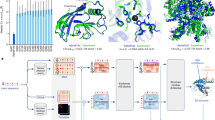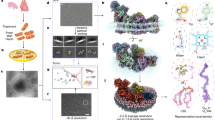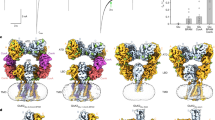Abstract
IN a study of the properties of the acetylcholine receptor protein (AChR) solubilised from extrasynaptic and sub-synaptic areas of rat diaphragm, Brockes and Hall1 reported differences in the behaviour of these receptors on isoelectric focusing and concluded that extrasynaptic and subsynaptic receptors “have similar properties but are still distinct molecules”. Applying the same technique to crude detergent extracts of membrane fragments from Electrophorus electricus electric organ2, we also found two forms of AChR with isoelectric points similar to those reported by Brockes and Hall. Furthermore a catalytic interconversion between these two forms was achieved by incubating in vitro the membrane extract in the presence of 100 mM NaCl or 100 mM NaF. This finding was interpreted as resulting from a phosphorylation-dephosphorylation of the AChR. In agreement with this interpretation, it has been shown3 that endogenous protein kinase and phosphoprotein phosphatase activities are indeed present in membrane fragments isolated from the electric organ of E. electricus. We report here that in detergent extracts of these membrane fragments, a phosphorylation of AChR takes place when incubated in the presence of γ-32P-ATP, Mn2+ and the endogenous protein kinases.
This is a preview of subscription content, access via your institution
Access options
Subscribe to this journal
Receive 51 print issues and online access
$199.00 per year
only $3.90 per issue
Buy this article
- Purchase on Springer Link
- Instant access to full article PDF
Prices may be subject to local taxes which are calculated during checkout
Similar content being viewed by others
References
Brockes, J. P. & Hall, Z. W. Biochemistry 14, 2092–2099; 2100–2106 (1975).
Teichberg, V. I. & Changeux, J. P. FEBS Lett. 67, 264–268 (1976).
Teichberg, V. I. & Changeux, J. P. FEBS Lett. 74, 71–76 (1977).
Olsen, R., Meunier, J. C. & Changeux, J. P. FEBS Lett. 28, 96–100 (1972).
Meunier, J. C., Sealock, R., Olsen, R. & Changeux, J. P. Eur. J. Biochem. 45, 371–394 (1974).
Weeke, B. Scand. J. Immun. 2, Suppl. 1, 47–56 (1973).
Karlin, A. & Cowburn, D. A. Proc. natn. Acad. Sci. U.S.A. 70, 3636–3640 (1973).
Changeux, J. P. Handbook of Psychopharmacology 6, (eds Iversen, L. L., Iversen, S. D. & Snyder, S. H.) 235–301 (1975).
Greengard, P. Nature 260, 101–108 (1976).
Changeux, J. P. & Danchin, A. Nature 264, 705–712 (1976); Changeux, J. P., Courrège, P., Danchin, A. & Lasry, J. M. (in preparation).
Laemmli, U.K. Nature 227, 680–685 (1970).
Anderson, C. W. & Gesteland, R. F. J. Virol. 9, 758–765 (1972).
Author information
Authors and Affiliations
Rights and permissions
About this article
Cite this article
TEICHBERG, V., SOBEL, A. & CHANGEUX, JP. In vitro phosphorylation of the acetylcholine receptor. Nature 267, 540–542 (1977). https://doi.org/10.1038/267540a0
Received:
Accepted:
Issue Date:
DOI: https://doi.org/10.1038/267540a0
This article is cited by
-
50 years of allosteric interactions: the twists and turns of the models
Nature Reviews Molecular Cell Biology (2013)
-
Desensitization of the nicotinic acetylcholine receptor: Molecular mechanisms and effect of modulators
Cellular and Molecular Neurobiology (1989)
-
Regulation of nicotinic acetylcholine receptors by protein phosphorylation
Molecular Neurobiology (1988)
-
Neuronal phosphoproteins
Molecular Neurobiology (1987)
Comments
By submitting a comment you agree to abide by our Terms and Community Guidelines. If you find something abusive or that does not comply with our terms or guidelines please flag it as inappropriate.



